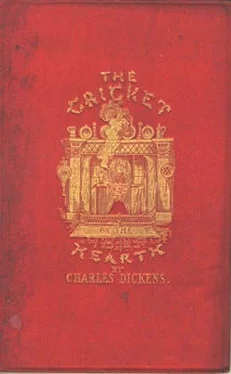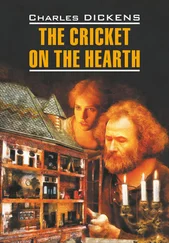Charles Dickens - The Cricket on the Hearth
Здесь есть возможность читать онлайн «Charles Dickens - The Cricket on the Hearth» — ознакомительный отрывок электронной книги совершенно бесплатно, а после прочтения отрывка купить полную версию. В некоторых случаях можно слушать аудио, скачать через торрент в формате fb2 и присутствует краткое содержание. Жанр: Классическая проза, Сказка, на английском языке. Описание произведения, (предисловие) а так же отзывы посетителей доступны на портале библиотеки ЛибКат.
- Название:The Cricket on the Hearth
- Автор:
- Жанр:
- Год:неизвестен
- ISBN:нет данных
- Рейтинг книги:4 / 5. Голосов: 1
-
Избранное:Добавить в избранное
- Отзывы:
-
Ваша оценка:
- 80
- 1
- 2
- 3
- 4
- 5
The Cricket on the Hearth: краткое содержание, описание и аннотация
Предлагаем к чтению аннотацию, описание, краткое содержание или предисловие (зависит от того, что написал сам автор книги «The Cricket on the Hearth»). Если вы не нашли необходимую информацию о книге — напишите в комментариях, мы постараемся отыскать её.
The Cricket on the Hearth — читать онлайн ознакомительный отрывок
Ниже представлен текст книги, разбитый по страницам. Система сохранения места последней прочитанной страницы, позволяет с удобством читать онлайн бесплатно книгу «The Cricket on the Hearth», без необходимости каждый раз заново искать на чём Вы остановились. Поставьте закладку, и сможете в любой момент перейти на страницу, на которой закончили чтение.
Интервал:
Закладка:
The soft–hearted Slowboy trailed off at this juncture, into such a deplorable howl, the more tremendous from its long suppression, that she must infallibly have awakened the Baby, and frightened him into something serious (probably convulsions), if her eyes had not encountered Caleb Plummer, leading in his daughter. This spectacle restoring her to a sense of the proprieties, she stood for some few moments silent, with her mouth wide open; and then, posting off to the bed on which the Baby lay asleep, danced in a weird, Saint Vitus manner on the floor, and at the same time rummaged with her face and head among the bedclothes, apparently deriving much relief from those extraordinary operations.
‘Mary!’ said Bertha. ‘Not at the marriage!’
‘I told her you would not be there, mum,’ whispered Caleb. ‘I heard as much last night. But bless you,’ said the little man, taking her tenderly by both hands, ‘I don’t care for what they say. I don’t believe them. There an’t much of me, but that little should be torn to pieces sooner than I’d trust a word against you!’
He put his arms about her and hugged her, as a child might have hugged one of his own dolls.
‘Bertha couldn’t stay at home this morning,’ said Caleb. ‘She was afraid, I know, to hear the bells ring, and couldn’t trust herself to be so near them on their wedding–day. So we started in good time, and came here. I have been thinking of what I have done,’ said Caleb, after a moment’s pause; ‘I have been blaming myself till I hardly knew what to do or where to turn, for the distress of mind I have caused her; and I’ve come to the conclusion that I’d better, if you’ll stay with me, mum, the while, tell her the truth. You’ll stay with me the while?’ he inquired, trembling from head to foot. ‘I don’t know what effect it may have upon her; I don’t know what she’ll think of me; I don’t know that she’ll ever care for her poor father afterwards. But it’s best for her that she should be undeceived, and I must bear the consequences as I deserve!’
‘ Mary,’ said Bertha, ‘where is your hand! Ah! Here it is here it is!’ pressing it to her lips, with a smile, and drawing it through her arm. ‘I heard them speaking softly among themselves, last night, of some blame against you. They were wrong.’
The Carrier’s Wife was silent. Caleb answered for her.
‘They were wrong,’ he said.
‘I knew it!’ cried Bertha, proudly. ‘I told them so. I scorned to hear a word! Blame her with justice!’ she pressed the hand between her own, and the soft cheek against her face. ‘No! I am not so blind as that.’
Her father went on one side of her, while Dot remained upon the other: holding her hand.
‘I know you all,’ said Bertha, ‘better than you think. But none so well as her. Not even you, father. There is nothing half so real and so true about me, as she is. If I could be restored to sight this instant, and not a word were spoken, I could choose her from a crowd! My sister!’
‘Bertha, my dear!’ said Caleb, ‘I have something on my mind I want to tell you, while we three are alone. Hear me kindly! I have a confession to make to you, my darling.’
‘A confession, father?’
‘I have wandered from the truth and lost myself, my child,’ said Caleb, with a pitiable expression in his bewildered face. ‘I have wandered from the truth, intending to be kind to you; and have been cruel.’
She turned her wonder–stricken face towards him, and repeated ‘Cruel!’
‘He accuses himself too strongly, Bertha,’ said Dot. ‘You’ll say so, presently. You’ll be the first to tell him so.’
‘He cruel to me!’ cried Bertha, with a smile of incredulity.
‘Not meaning it, my child,’ said Caleb. ‘But I have been; though I never suspected it, till yesterday. My dear blind daughter, hear me and forgive me! The world you live in, heart of mine, doesn’t exist as I have represented it. The eyes you have trusted in, have been false to you.’
She turned her wonder–stricken face towards him still; but drew back, and clung closer to her friend.
‘Your road in life was rough, my poor one,’ said Caleb, ‘and I meant to smooth it for you. I have altered objects, changed the characters of people, invented many things that never have been, to make you happier. I have had concealments from you, put deceptions on you, God forgive me! and surrounded you with fancies.’
‘But living people are not fancies!’ she said hurriedly, and turning very pale, and still retiring from him. ‘You can’t change them.’
‘I have done so, Bertha,’ pleaded Caleb. ‘There is one person that you know, my dove—’
‘Oh father! why do you say, I know?’ she answered, in a term of keen reproach. ‘What and whom do I know! I who have no leader! I so miserably blind.’
In the anguish of her heart, she stretched out her hands, as if she were groping her way; then spread them, in a manner most forlorn and sad, upon her face.
‘The marriage that takes place to–day,’ said Caleb, ‘is with a stern, sordid, grinding man. A hard master to you and me, my dear, for many years. Ugly in his looks, and in his nature. Cold and callous always. Unlike what I have painted him to you in everything, my child. In everything.’
‘Oh why,’ cried the Blind Girl, tortured, as it seemed, almost beyond endurance, ‘why did you ever do this! Why did you ever fill my heart so full, and then come in like Death, and tear away the objects of my love! O Heaven, how blind I am! How helpless and alone!’
Her afflicted father hung his head, and offered no reply but in his penitence and sorrow.
She had been but a short time in this passion of regret, when the Cricket on the Hearth, unheard by all but her, began to chirp. Not merrily, but in a low, faint, sorrowing way. It was so mournful that her tears began to flow; and when the Presence which had been beside the Carrier all night, appeared behind her, pointing to her father, they fell down like rain.
She heard the Cricket–voice more plainly soon, and was conscious, through her blindness, of the Presence hovering about her father.
‘Mary,’ said the Blind Girl, ‘tell me what my home is. What it truly is.’
‘It is a poor place, Bertha; very poor and bare indeed. The house will scarcely keep out wind and rain another winter. It is as roughly shielded from the weather, Bertha,’ Dot continued in a low, clear voice, ‘as your poor father in his sack–cloth coat.’
The Blind Girl, greatly agitated, rose, and led the Carrier’s little wife aside.
‘Those presents that I took such care of; that came almost at my wish, and were so dearly welcome to me,’ she said, trembling; ‘where did they come from? Did you send them?’
‘No.’
‘Who then?’
Dot saw she knew, already, and was silent. The Blind Girl spread her hands before her face again. But in quite another manner now.
‘Dear Mary, a moment. One moment? More this way. Speak softly to me. You are true, I know. You’d not deceive me now; would you?’
‘No, Bertha, indeed!’
‘No, I am sure you would not. You have too much pity for me. Mary, look across the room to where we were just now—to where my father is—my father, so compassionate and loving to me—and tell me what you see.’
‘I see,’ said Dot, who understood her well, ‘an old man sitting in a chair, and leaning sorrowfully on the back, with his face resting on his hand. As if his child should comfort him, Bertha.’
‘Yes, yes. She will. Go on.’
‘He is an old man, worn with care and work. He is a spare, dejected, thoughtful, grey–haired man. I see him now, despondent and bowed down, and striving against nothing. But, Bertha, I have seen him many times before, and striving hard in many ways for one great sacred object. And I honour his grey head, and bless him!’
Читать дальшеИнтервал:
Закладка:
Похожие книги на «The Cricket on the Hearth»
Представляем Вашему вниманию похожие книги на «The Cricket on the Hearth» списком для выбора. Мы отобрали схожую по названию и смыслу литературу в надежде предоставить читателям больше вариантов отыскать новые, интересные, ещё непрочитанные произведения.
Обсуждение, отзывы о книге «The Cricket on the Hearth» и просто собственные мнения читателей. Оставьте ваши комментарии, напишите, что Вы думаете о произведении, его смысле или главных героях. Укажите что конкретно понравилось, а что нет, и почему Вы так считаете.










